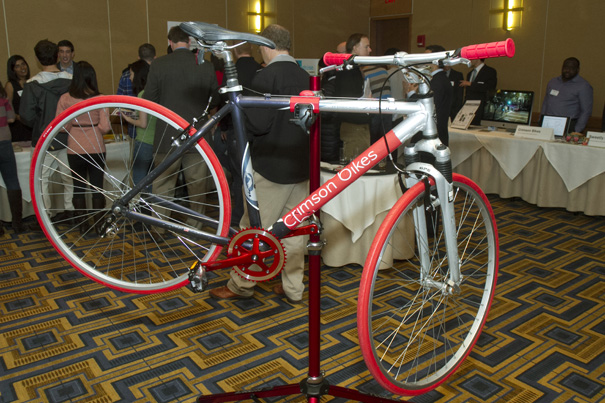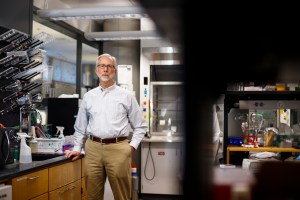
A bike-sharing program was one of 25 semifinalist projects featured at the showcase and awards reception of the Harvard College Innovation Challenge.
Jon Chase/Harvard Staff Photographer
Ideas galore
Innovation challenge brings out best in student entrepreneurs
Students participating in the Harvard College Innovation (I3) Challenge this year generated dozens of promising ideas to improve the quality of daily life. For some teams, that objective meant tackling education, health care, poverty, or crime — for others, the more mundane challenge of finding a shoe that fits.
Drawn by the call to “imagine — invent — impact,” a record number of students participated in the yearlong I3 program, forming 78 teams with students from 34 concentrations. Over the course of the year, the Technology and Entrepreneurship Center at Harvard (TECH) and Harvard Student Agencies coached the teams through the process of developing business plans and provided the students with mentors for legal advice and other needs. The semifinalists, 25 teams in all, gathered on March 29 to share their final projects at a showcase and awards reception.
“The student startups were really impressive this year,” said Paul Bottino, executive director of TECH, which is based at the Harvard School of Engineering and Applied Sciences (SEAS).
“It’s inspiring to see the great range of needs and problems that these student-innovators are motivated to address,” Bottino said. “They combine their education with creativity and technology to take on important social needs and discover compelling opportunities to pursue.”
The I3 finale, held in the ballroom of the Charles Hotel in Cambridge, culminated in the presentation of six awards.
Public-Sector Innovation Award (presented by Accenture)
The winner of the $10,000 prize was Instiglio, an initiative that connects nonprofits with government funding by encouraging private funding agencies to “bet on outcomes” through social impact bonds. Successful projects — for example, an effort to reduce new HIV infections in a city — would have initial funding repaid by the government. Instiglio plans to apply this model, which has been used successfully in Massachusetts and the United Kingdom, to social problems in developing nations.
The founding members of Instiglio are enrolled at the Harvard Kennedy School, working toward master’s degrees in public policy or public administration and international development: Michael Belinsky, M.P.P. ’12; David Bullon, M.P.A./I.D. ’12; Michael Eddy, M.P.A./I.D. ’12; Avinish Gungadurdoss, M.P.A./I.D. ’12; and Madalina Pruna, M.P.A./I.D. ’12.
“It’s been an amazing journey,” said Gungadurdoss, reflecting on the experience of developing an idea under deadline pressure with his teammates. “You learn to remove your blinders and start seeing things you would normally see as barriers as new opportunities.”
McKinley Family Grant for Innovation and Entrepreneurial Leadership in a Commercial Enterprise
The $10,000 prize was awarded to Shoesy, a biometric approach to shoe shopping that takes precise measurements of a buyer’s feet, creates a digital 3-D model, and matches it electronically to the specifications of available footwear.
The idea, developed by William Marks ’13 (biomedical engineering), Svilen Kanev ’12 (computer science), and Christina Chang, M.B.A. ’13, is “to find the shoe that fits your foot individually.”
“When you place an order online, you don’t have to worry whether they’ll fit when they get there,” the team says.
McKinley Family Grant for Innovation and Entrepreneurial Leadership in a Social Enterprise
The winner of the $10,000 prize was Global Village Fruits, a project led by Annemarie Ryu ’13 (social anthropology) and Devon Ray Williams ’11 (computer science).
Global Village Fruits aims to market organic and fair-trade jackfruit products in the United States. Ryu came upon the nutritious fruit during a trip to Bangalore, India.
“I’m in a totally new place, trying to get a new phone; there are cows sitting in the street, and there are these huge green things sitting in piles,” she recalled. So she tried one. “It was the most delicious thing ever.”
Ryu and Williams hope that the dried fruit and the gluten-free flour ground from the seeds may find a market in American specialty stores and bakeries. They plan to reinvest profits in the processing infrastructure in India.
While receiving the award, Ryu announced that she had received an email from Whole Foods just two days before, announcing that the chain would like to put the team’s jackfruit products on its shelves in 28 Northeastern stores.
TECH Prize
The $5,000 TECH Prize, awarded to the best senior project, went to Sophy Lee ’12 (economics), who collaborated with Andrey Liscovich, a Ph.D. student in public policy, to create BigEd.
BigEd is a platform for online learning that aims to host universities’ Web-based courses and integrate them with tools that enhance the social experience of distance education.
One such feature creates a two-dimensional map of academic fields. Users can zoom into subfields and identify a route of courses that might take them there, for example, from precalculus to economic modeling. Another feature allows students to provide real-time feedback to an instructor giving a remote lecture.
Lee and Liscovich have begun discussions with Wolfram Alpha with the goal of using Wolfram’s natural language processing tools to automatically grade students’ problem sets (in STEM fields).
Social Entrepreneurship Prize for Seniors (sponsored by the Coop)
The $5,000 Social Entrepreneurship Prize was awarded to Shreya Maheshwari ’12 (economics), whose project Healthy U and Me is developing affordable educational materials to teach young Indian children about preventive health care.
Targeting particular rural areas known to be at high risk for malaria, cholera, and dengue fever, Maheshwari and her collaborators outside Harvard have been partnering with nongovernmental organizations that understand the local communities and cultures.
The main challenge they face is to scale the successful model across a vast and diverse population.
Harvard Student Agencies (HSA) Award
HSA recognized PollVaultr, by Merrill Lutsky ’15, Lexi Ross ’13 (computer science), and Erik Schluntz ’15.
Their project aims to implement short customer surveys at store checkouts to improve low response rates and negatively biased sets of responses.
“It’s simply too hard for a customer to enter a URL from a receipt,” said Lutsky. “We want to put the survey right in front of them at the point of sale.”
The team hopes that surveys administered through PollVaultr will generate larger data sets and more balanced responses.
The winning projects join a group of successful I3 “alumni” that includes Newsle, Styleta, HerCampus, and HSA Rover.





